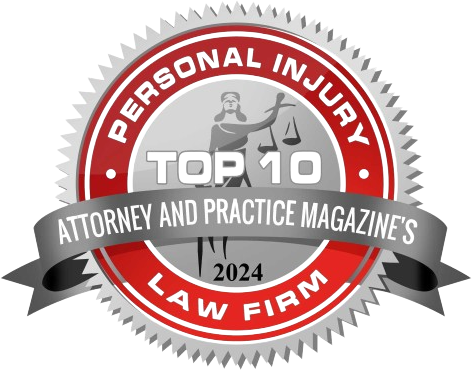


Longshore & Harbor Workers’ Compensation Lawyers in Virginia
Virginia longshore and harbor work puts you at an increased risk of serious injury compared to other careers. When you suffer a work injury or work-related illness that renders you unable to work, you and your family suffer greatly. You face lost wages and mounting medical bills you may be unable to pay.
Longshore workers are eligible for workers’ compensation benefits. At Montagna Law, our Virginia workers’ compensation lawyers can help you fight for fair compensation and a settlement that covers your needs so you can focus on healing. Reach out to our firm today to learn more.
Call (877) 622-8100 or complete the online contact form to request a free consultation.
100% no fees unless we win your case!
-
If you’re looking for someone who’s professional, attentive, serious, caring, and negotiable than Mr. Anthony Montagna is who you need. He understood his assignment and delivered well especially being with what I was looking at in my case. I want …– Tiara S.
-
I don’t know how he does it, but this man is a monster in the courtroom. I’ll admit I had fears of the outcome of my case, but when I was with Mr. Montagna in front of a judge. My confidence started to raise. Extremely professional and how he hand…– BD P.
-
Honestly , Mr. Montagna treats like you are his family the way he cares, he takes care of his people , I was doing triple digit speed on a 60 and lord I thought it was over for me in that courtroom , he’s a genius because I literally got away with…– Justin
-
I have been a client of Montagna Law since 2014. Because the customer service is exceptional, I have established a rapport with everyone in the office. As a customer for 8 years, it is noted that this firm goes above and beyond for the clients.– Eric E.
-
Montagna Law are wonderful attorneys. I was diagnosed with stage 4 lung cancer and they assisted me from day one when I contacted them. I highly recommend their services! Thanks guy’s and gal’s for your services!– Kevin B
What Are the Risks of Virginia Longshore and Harbor Work?
Working on the shore or harbors of Virginia carries risks for workers unique from other jobs, even greater in some cases than construction workers. These can include the following:
Heavy Machine or Equipment Accidents
Longshoremen deal with heavy equipment daily, and accidents occur all the time. Ship-breakers, for example, use dangerous equipment to dispose of ships that are no longer in use. Whether an injury is due to equipment failure, improper safety protocols, or a simple accident, it causes injured workers great pain and suffering.
Falls From Heights
Falls are some of the most common injuries across many industries, and longshore work is no different. With this type of job, however, workers climb ladders, work on scaffolding, and traverse catwalks high above the ground. A fall from a great height can result in severe lifelong personal injury or death.
Slip and Fall Risks
Even when not high up, longshore workers face risks of slip and fall injuries every day. They work on wet, slick surfaces along wharves and have exposure to grease and oil from machinery. If this happens to you, you deserve workers’ comp.
Falling Objects
Longshore workers are at sites like shipyards that constantly carry the risk of falling tools, buckets, debris, and other objects. Shipbuilders climb all around ships with tools and gear that can be knocked loose and fall, causing severe injury.
Explosions and Fires
The proximity of fuel and other volatile chemicals creates the risk of explosions and fires. When Virginia longshore workers are too close to these chemicals, they can face lifelong injury and disfigurement.
Repetitive Use Injuries
Repetitive use injuries include things like carpal tunnel syndrome. These can result from using hammers, drills, or any other motion you do every day, all day. Even typing on a computer can cause these sorts of injuries.
Toxic Substance Injuries
Exposure to toxic substances can cause occupational diseases, poisoning, and other health conditions. These substances can cause cancer and lifelong medical costs.
Hearing Damage From Loud Sounds
Explosions, the banging of equipment, falling objects, ship-breaking, and other sounds can carryhigh decibels on a job site. Exposure to these loud sounds can cause permanent hearing loss.

What Causes a Risk of Injury to Virginia Longshore Workers?
There are many potential causes of injuries and illnesses to longshoremen. They can include the following.
Improper Safety Training
Safety is paramount when on a dangerous job site for harbor workers, shipbuilders, wharf workers, oil rig workers, or ship breakers. If the job site does not properly train workers, deadly accidents can result.
Unsafe Equipment
Proper equipment is essential to keeping workers safe. When personal protective equipment (PPE) is not provided or is inadequate for the job, this can result in injured employees.
Problems With Machinery
Machinery along the seashore is constantly exposed to humid salt air. This can wear down machinery and corrode parts. These machines must be constantly maintained, and if they are not, they can break down and cause injuries.
Unsafe Work Conditions
Longshore work is dangerous in nature. Employers must keep work conditions as safe as possible. Many workers’ comp injury claims result from simple unsafe conditions.
Negligence of Supervisors
Supervisor negligence means that a supervisor, a foreman, or other management personnel fail to do their due diligence, which can lead to any of the above conditions. An important part of the supervisor’s job is ensuring that employees are properly trained and have the right safety gear, and that the job site is as safe as possible. An injury case may result when a supervisor acts negligently.
When you are hurt on a longshore job site, it is important to contact a qualified injury attorney with practice areas involving maritime law such as the Jones Act and Longshore Act, workers’ compensation law, and the risks that maritime workers face every day. At the law firm of Montagna Law, our injury lawyers are ready to provide legal advice and representation for your workers’ compensation claim. Call us today at 757-622-8100 or complete our online contact form for a free consultation.
What is the Longshore and Harbor Workers’ Compensation Act?
The Longshore and Harbor Workers’ Compensation Act, also called the LHWCA or Longshore Act, is a federal law that guarantees workers’ compensation for injuries that occur on navigable waters of the United States. This law covers most maritime occupations, including longshore workers, construction workers, shipbuilders, ship-repair workers, and ship breakers. The LHWCA also covers non-maritime employees if their work happens on navigable waters.
What Types of Benefits Are Available Under the LHWCA?
The Longshore Act offers several workers’ compensation benefits to longshore harbor workers. The intention is to allow you to cover your expenses while you focus on healing, as with any form of workers’ compensation.
Medical Compensation
Medical benefits cover the costs of all medical care, from doctor’s visits to medication, surgical and diagnostic procedures, physical therapy, and even transportation to and from appointments. Workers’ compensation should cover all of the medical bills associated with your injury.
Lost Wages
Workers’ comp benefits cover a portion of the wages you lose while healing from a serious personal injury. These normally amount to two-thirds of the average weekly wage before your injury, but they may be modified based on your level of disability and capped at a level that changes every year.
Disability Compensation
You may be able to collect disability compensation for specific injuries that carry long-term effects. Insurance companies will look at whether your disability is partial or total, temporary or permanent, and the amount and duration of compensation to which you are entitled will be determined based on that rating.
Partial disabilities assume you can still do some work, even on a limited basis. Total disability means you cannot work at all. Temporary disability means you are expected to get better, while permanent disability means you have reached a state of maximum medical improvement. If you have a permanent disability, you may be able to receive benefits for life, while temporary disability will be limited to a fixed number of weeks.
Death Benefits
Those who lose a loved one to a workplace accident or illness may be entitled to receive death benefits. These can include the wage and medical benefits offered to injured workers as well as funeral and burial expenses. If you lose a family member to a maritime or longshore injury, you should speak with an experienced maritime law attorney to seek these benefits.
What is the Merchant Marine Jones Act?
The Jones Act is a federal statute supporting workers injured at sea. This act allows seamen to bring personal injury cases against their employers by extending the Federal Employers’ Liability Act to seamen. This act removes the confusion when injuries occur outside of a particular state due to being on the water. If you are unsure whether you can bring a personal injury claim against an employer under the Jones Act, a qualified longshore workers’ compensation attorney may be able to help.
Should I Be Cautious About the Insurance Company’s Settlement Offers?
You should always be cautious about offers from insurance companies. These companies are the ones that pay workers’ compensation claims, but they are not out to provide fair coverage to longshoremen. Rather, they seek to pay as little as possible for injury cases. Insurance companies are for-profit companies that do not make money by paying large claims.
For this reason, you should contact a knowledgeable work injury attorney if you are injured while working on the water or in a shipyard. Workers’ comp attorneys know how to stand up against insurance providers and fight for the full benefits you deserve.
How Can a Workers’ Compensation Attorney Help Me?
Maritime workers have unique laws in place to protect them, and that is because their job carries unique risks. The injuries and occupational diseases common to maritime workers can lead to lifelong disability and expensive medical bills. Virginia workers’ compensation law can get complicated and carry tight deadlines. Adding the challenges of maritime work makes it even more confusing and difficult because your injury may occur off Virginia soil, which can carry complications when dealing with the state Workers’ Compensation Commission.
Having an attorney well-versed in workers’ compensation benefits and maritime law is vital to ensuring you have access to the full benefits to which you are entitled. Montagna Law has a team of experienced injury lawyers who also understand the complexities of maritime injury claims.
Why Choose Montagna Law for Your Virginia Beach Virginia Longshore and Harbor Workers’ Compensation Claim?
We have a skilled team of Hampton Roads attorneys serving Newport News, Chesapeake, Suffolk, Norfolk, Portsmouth, and the Virginia Beach areas. We also assist maritime workers in New Jersey, Delaware, Maryland, and North Carolina. We are knowledgeable and experienced in both personal injury and maritime law. These areas coincide when you are hurt at a shipyard or on a dock. We are aggressive and tenacious trial lawyers who fight every step of the way for our clients’ right to fair compensation. Our legal team has helped numerous injured employees and shipbuilders secure the benefits and compensation they deserve.
If you are a longshore worker who has been hurt at sea, do not delay and put your case at risk. Our Virginia longshore and harbor workers’ compensation attorneys are here to listen to your case and provide the representation and legal advice you need. There is no disclaimer and no obligation. Just give us a call today at 757-622-8100 or fill out our easy online form to schedule a consultation.









